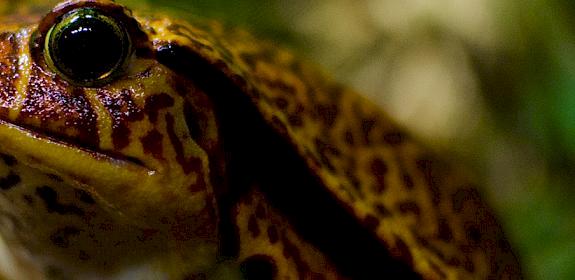EU develops response to Africa’s wildlife crisis
Brussels, Belgium, 10th February 2015—the European Union (EU) met this week to develop an holistic strategy and plan its activities in support of wildlife conservation in Africa over the next decade.

Underpinning the discussions was a final draft of the EU’s strategic technical report entitled “Larger than Elephants: Inputs for the design of an EU Strategic Approach to Wildlife Conservation in Africa.”
TRAFFIC provided in-depth comments on the threats posed to Africa’s biodiversity by illegal and unsustainable wildlife trade during the production of this document, and was invited to present at the meeting on the topic of fostering regional co-operation and information exchange to combat wildlife crime in Africa.
The Technical Meeting was convened by the European Commission’s Directorate General for Development and Cooperation (DEVCO), and assembled expert partners from Europe and Africa, from governmental and intergovernmental institutions, specialists from the development and science sectors and from non-governmental organizations.
“Africa’s wildlife is under immense pressure currently, particularly from poaching, which can only be curtailed through concerted international co-operation bolstered by exemplary national commitments,” said Roland Melisch, TRAFFIC’s Senior Programme Director for Africa and Europe.
Key to the EU’s Africa wildlife strategy will be the conservation of large functioning ecosystems or landscapes supporting wildlife populations and how sustained funds can be made available for maximum conservation impact.
TRAFFIC’s main interventions and comments on the final draft of the Strategy focussed on:
• Supporting innovative approaches to combatting illegal wildlife trade;
• Applying solutions that are known to be effective;
• Supporting African-based solutions, including promoting collaboration and capacity building for officers mandated to combat wildlife crime;
• Securing collaboration between African, Asian and European countries to achieve consumer behaviour change aimed at reducing the demand for illegally acquired wildlife commodities.
Another key aspect of the approaches will be monitoring of the effectiveness of each and adapting them as necessary for maximum effectiveness.
“This week’s meeting demonstrates the EU’s long-term strategic commitment towards ensuring a secure future for Africa’s wildlife and the people dependent upon it,” said Melisch.
“TRAFFIC also welcomes the announcement by DEVCO to develop a strategy specifically for Africa’s marine and freshwater wildlife to complement the draft strategy for wildlife conservation.”




